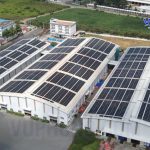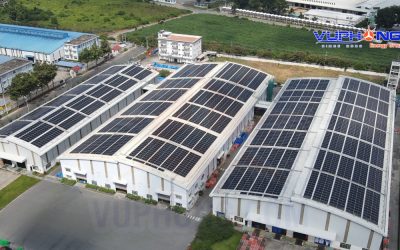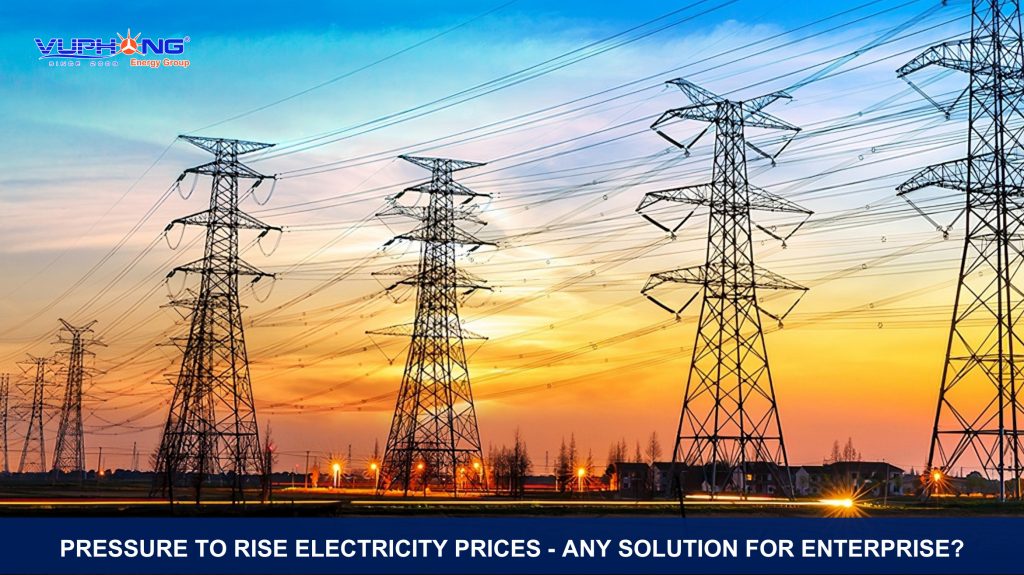
The average retail electricity price (excluding VAT) has been raised by 220-537 dong per kWh. The Ministry of Industry and Trade has also issued a document requiring Vietnam Electricity to prepare a proposal for the average retail electricity price in 2023, as well as the route and suitable adjustment level in the case of a rise in electricity prices soon as possible. Electricity price is in a “waiting to increase” phase since increases are unavoidable due to the significant rise in electricity manufacturing input prices.
Increase electricity prices – increase pressure on manufacturing enterprises
Electricity price is always a prevalent issue since it directly affects people’s lifestyles and enterprises’ business operations. According to the NFIB (National Federation of Independent Business, US), energy cost, including electricity production, is one of the top three business costs for 35% of small enterprises. In certain industrial production sectors in Vietnam, energy prices may account for more than 60% of the product’s cost. An increase in electricity prices also means an increase in the consumer price index, which impacts macroeconomic stability and inflation. Meanwhile, after two years of “bracing” for the Covid-19 pandemic and the fluctuations of the world’s economic and political situation, make difficult market output, interest rates, inflation, oil costs, and transportation costs,..all high increased. An increase in electricity prices will put even more pressure on manufacturing companies.
Average retail electricity price framework (excluding VAT)
| New Price (according to Decision 02/2023/QD-TTg dated 03/02/2023) | Old Price (according to Decision 02/2023/QD-TTg dated 03/02/2023) | |
| Minimum average electricity retail price (VND/kWh) | 1,826.22 | 1,606.19 |
| Maximum average electricity retail price (VND/kWh) | 2,444.09 | 1,906.42 |
The energy crisis in 2022 became an obsession for many European businesses, causing them to decrease production and increase product prices, resulting in lost competitiveness and the closure of many factories. Many enterprises’ energy expenses increased from 5% to 25% of manufacturing costs. Because energy prices rose too quickly and consumer demand decreased, many businesses were forced to reduce production. It is estimated that nearly 10% of Europe’s steel production lines have been temporarily shut down. According to a survey taken by the German Chamber of Commerce and Industry, more than a quarter of chemical companies and 16% of the automotive industry had to reduce production, while 17% of automotive companies had to plan to relocate some production activities to cheaper and more reliable energy-producing locations.
See details at the article: Proactive energy price for businesses: European lessons
Be proactive about energy costs – the problem should be prioritized
The Prime Minister’s Decision 02/2023/QD-TTg dated February 3, 2023, regarding the retail electricity price average framework, the new framework has been adjusted to increase – with a floor/minimum price increase of 220 dong and a ceiling/maximum price increase of 538 dong/kWh, resulting in an increased range of 13% to 28% compared to the old retail electricity price framework.
According to some experts, if the Price Law principles are appropriately implemented, the adjusted electricity price should rise by 15% above the current price. However, this level may directly raise the first round of inflation by roughly 5%, not to mention the effect on the second round and the impact on the production costs of sectors that rely heavily on power (the steel industry rises by 0.9%, cement by 2.25%, and textile by 1.95%).
Recently, at the Ministry of Industry and Trade’s conference “Promoting Domestic Production, Consumption, and Export Market Expansion in 2023,” Prime Minister Chinh, Pham Minh emphasized that Vietnam’s electricity prices cannot be compared to developed countries, as prices that are too high would be unbearable for the people, businesses, and economy. He also suggested that the Ministry of Industry and Trade consider this issue comprehensively, with a balance of benefits, difficulties, and risks shared by the government, businesses, and citizens, and operating in a manner, balancing, harmoniously, reasonably between inflation and growth.
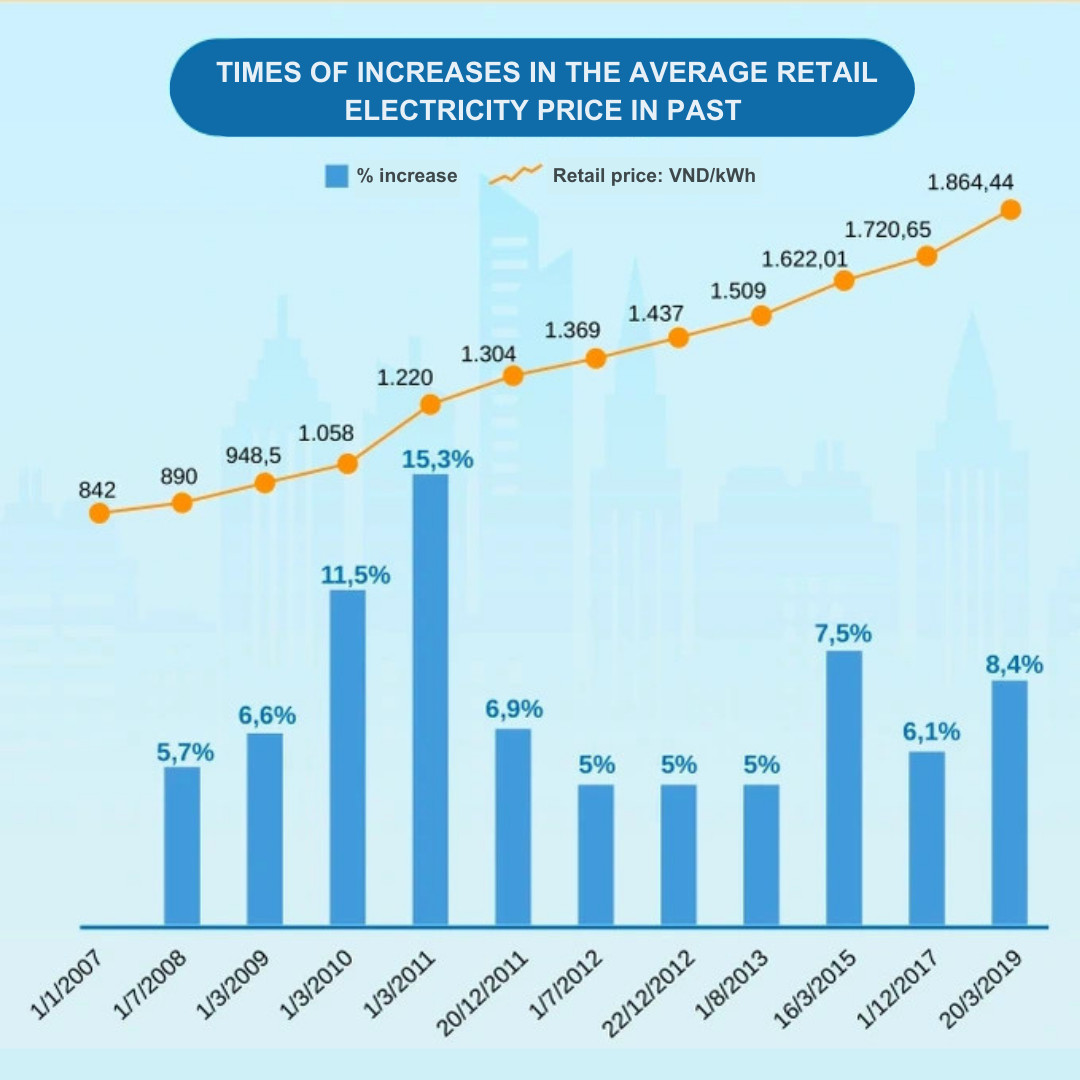
As a result, electricity prices are in a “waiting to increase” phase, with careful calculations and studies being performed to determine the extent and route of the increase. From a market perspective, an increase in electricity prices is considered unavoidable, given prices for all commodities have risen, as have the costs of electricity production inputs. As a result, instead of waiting for a low rising electricity price rate from the electrical sector, companies can proactively implement cost-saving energy solutions to reduce the impact of rising electricity costs on production activities.
Investing in the technological renovation, production line improvements, upgraded equipment, reusing waste heat, and restructuring production to reduce the fuel cost from petroleum, prioritizing natural energy sources, and regenerative energy are all solutions that can assist businesses in reducing energy costs in production activities. Especially when companies need to focus on capital sources to restore production or invest in technological innovation, companies may use flexible collaboration forms to utilize capital from development units and investment funds, such as the solar power PPA (Power Purchase Agreement) cooperation model.
The PPA (Power Purchase Agreement) model is a pioneering Vu Phong Energy Group cooperation with reputable domestic and international investment funds. Under this cooperation model, Vu Phong Energy Group and our partners are investment funds investing in high-quality solar power systems on the enterprise’s roof, selling energy or leasing the system for a time at a reasonable price. Businesses only need to take advantage of the idle factory roof, using clean energy to serve production and business activities at a price that is always lower than the current electricity price, and ensure the benefits of saving electricity costs at any EVN pricing.
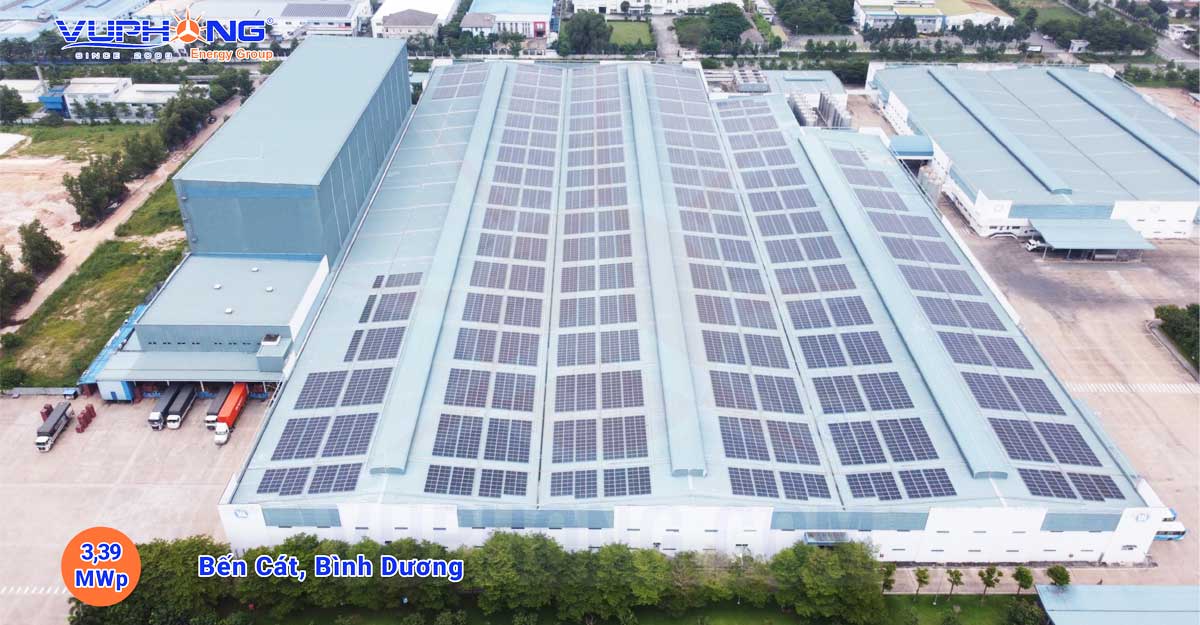
With a long-term contract, PPA (Power Purchase Agreement) cooperation model help businesses are proactive about energy prices and minimize risks from future increases in electricity prices. At the end of the agreement, the solar power system will be transferred for free (0 VND) to businesses, with a commitment to system performance when transferring more than 80-90%, depending on the conditions. This will be an effective solution that allows the company to save energy and contribute to greening the manufacturing process, which is particularly important in the global context toward green growth and sustainable development.
Businesses interested in the PPA (Power Purchase Agreement) solar power system and clean energy solutions to greening production, towards sustainable development, please contact Our Call Center via 1800 7171 or +84 9 1800 7171 or send an email to hello@vuphong.com for more information.
Vu Phong Energy Group


